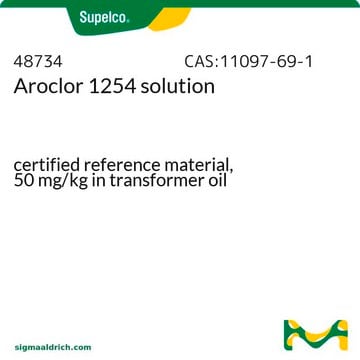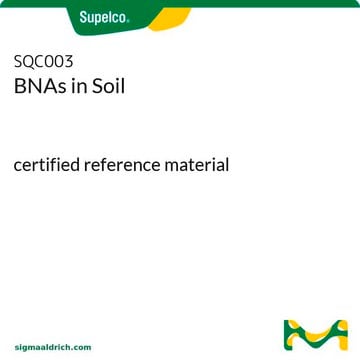BCR159
Dibenzo[a,h]pyrene
BCR®, certified reference material
About This Item
Recommended Products
grade
certified reference material
Agency
BCR®
manufacturer/tradename
JRC
technique(s)
HPLC: suitable
gas chromatography (GC): suitable
format
neat
storage temp.
2-8°C
SMILES string
c1ccc2c(c1)cc3ccc4c5ccccc5cc6ccc2c3c46
InChI
1S/C24H14/c1-3-7-19-15(5-1)13-17-9-12-22-20-8-4-2-6-16(20)14-18-10-11-21(19)23(17)24(18)22/h1-14H
InChI key
RXUSYFJGDZFVND-UHFFFAOYSA-N
Looking for similar products? Visit Product Comparison Guide
Analysis Note
BCR159
Legal Information
Signal Word
Danger
Hazard Statements
Precautionary Statements
Hazard Classifications
Carc. 1B - Muta. 2
Storage Class Code
6.1C - Combustible acute toxic Cat.3 / toxic compounds or compounds which causing chronic effects
WGK
WGK 3
Flash Point(F)
Not applicable
Flash Point(C)
Not applicable
Choose from one of the most recent versions:
Certificates of Analysis (COA)
Sorry, we don't have COAs for this product available online at this time.
If you need assistance, please contact Customer Support.
Already Own This Product?
Find documentation for the products that you have recently purchased in the Document Library.
Articles
This application note describes the fast and efficient separation of the EU’s list of 15 + 1 polynuclear aromatic hydrocarbons (PAHs) using Ascentis® Express PAH HPLC column.
Our team of scientists has experience in all areas of research including Life Science, Material Science, Chemical Synthesis, Chromatography, Analytical and many others.
Contact Technical Service![Dibenzo[a,l]pyrene BCR®, certified reference material](/deepweb/assets/sigmaaldrich/product/structures/937/930/3e2321b0-d54a-46c2-bb84-007bb57eb381/640/3e2321b0-d54a-46c2-bb84-007bb57eb381.png)
![Dibenzo[a,e]pyrene BCR®, certified reference material](/deepweb/assets/sigmaaldrich/product/structures/276/556/dd214831-9057-438a-b33d-aa10f7b4e48c/640/dd214831-9057-438a-b33d-aa10f7b4e48c.png)
![Benzo[a]pyrene ≥96% (HPLC)](/deepweb/assets/sigmaaldrich/product/structures/253/820/be96d879-1811-46c0-8f11-612019691c2d/640/be96d879-1811-46c0-8f11-612019691c2d.png)





